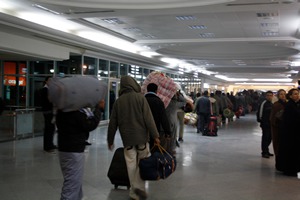As well as ethical concerns, there is no evidence to show that biological methods provide greater certainly of age than the existing holistic age assessment methods.

A growing number of children are being forced to leave their homes and families and seek safety in the UK. In the 12 months to September 2023, children have accounted for around 6 percent of all asylum claims in Britain, according to figures based on the UK government’s latest immigration statistics.
The number of children who are coming to the UK to claim asylum and not being believed about their age, is also on the rise, according to research by the Refugee Council.
The Refugee Council, which works with refugees and asylum seekers, says that there are many reasons why children arriving in Britain may not have the right identity documentation. They may have lost it during perilous journeys, traffickers may have given them false documents, or they may have a copy rather than the original. Additionally, children may not be aware of their age, as some cultures do not celebrate birthdays and record age.
The organisation points to the general consensus among practitioners that using holistic assessments carried out by a qualified social worker – known as the Merton Assessment – is the best method of determining whether an individual is 18. However, rather than supporting local authorities in using these non-invasive, holistic age assessments, the UK government decided to introduce so-called ‘scientific’ methods.
These biological methods include MRIs of knees and collar bones and X-rays of teeth, hands, and wrists. The government introduced two draft regulations that were debated in the House of Commons and House of Lords in November and are currently in the process of being implemented.
The Refugee Council has highlighted a number of concerns about using these biological methods. The organisation warns that in reality no method can determine a person’s age with precision. But despite this, the government is progressing with their plans, even though, by their own admission, the policy and design is still under development.
Together with the Royal College of Paediatrics and Child Health, the Refugee Council outlines its key concerns with the government’s intention to authorise the use of biological methods, including MRI scanning and X-rays, to assess the age of children seeking asylum.
The Parliamentary briefing is supported by the Refugee and Migrant Children Consortium (RMCC), a coalition of over 80 organisations working together to promote and protect the rights of migrants and young refugees.
The briefing notes how there has been no evidence to show that biological methods provide greater certainly of age than the existing Merton process.
It also highlights concerns with capacity and consent, warning that there has been no information provided on addressing a child’s capacity to understand and agree to a medical method of assessing their age and what will happen when a child does not have capacity.
“If a child seeking asylum is not looked after, and so has no legal guardian, and does not have the capacity to consent it is unclear who would be able to do so on their behalf,” the briefing notes.
Additional concerns include ambiguity over safeguarding, as it is not clear whether any safeguarding processes are going to be put in place before, during and after medical examinations to ‘minimise distress and ensure safeguarding from harm.’
There are also ethical concerns, with leading medical and professional bodies expressing apprehension about using medical methods for examinations that are not medical necessary and only service immigration control and enforcement purposes.
“Such a process will expose children to unnecessary stress and harmful medical examinations and the risk associated with exposure to radiation,” the briefing warns.
Age assessments at the port of entry is another concern, namely that the government does not publish data on the number of children “incorrectly treated as adults by these officials and subsequently taken into care when referred to a local authority.”
The impact such testing would have on health services is also raised in the report, with the Council noting how it is not clear who will conduct medical examinations, how requests will be raised, and who will bear the costs.
On the risks of biological testing on children, a Refugee Council spokesperson told LFF:
“The children we work with arrive here hoping to rebuild their lives, having made incredibly dangerous and traumatic journeys escaping violence and persecution all alone. They should be cared for and looked after while they are in the system, rather than being subject to further traumatic experiences by being made to go through inappropriate biological age assessments.
“The reality is that there is no single age assessment method which can determine someone’s age with precision. Supposedly scientific assessments carry medical and ethical risks, with the Government’s own scientific advisors saying they should not be widely used. They should only be used with extreme caution alongside other methods.”
Gabrielle Pickard-Whitehead is a contributing editor to Left Foot Forward
Left Foot Forward doesn't have the backing of big business or billionaires. We rely on the kind and generous support of ordinary people like you.
You can support hard-hitting journalism that holds the right to account, provides a forum for debate among progressives, and covers the stories the rest of the media ignore. Donate today.



